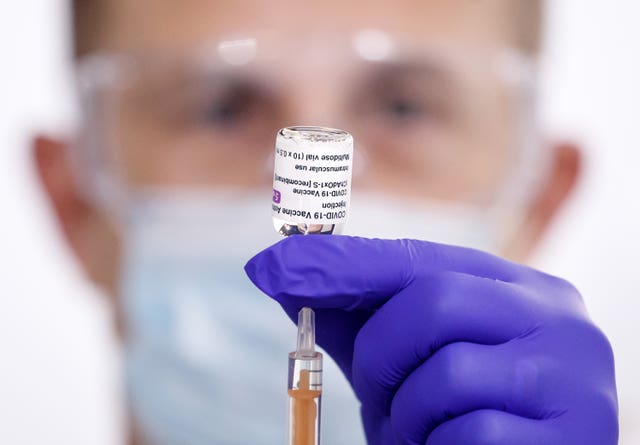What do we know about coronavirus variants?
Mutations in the virus could affect how it responds to vaccines and treatments, and could result in more serious Covid-19.

England’s deputy chief medical officer, Jonathan Van-Tam, has said the South African variant of coronavirus is unlikely to become the dominant strain in the UK.
The variant first detected in Kent is now thought to be the dominant one across the country.
New variants emerge regularly and experts are conducting frequent analysis to see which are of concern, and which are not.

– So what do we know about coronavirus variants?
There are currently four variants of concern:
UK/Kent variant: First detected in the UK and was first sequenced in the UK in September 2020 and called B117.
UK/Kent variant + E484K mutation: This variant was first detected in Bristol and is the UK variant (B117) with a genetic change also found in both the South African and Brazilian variants, E484K.
South African variant: First detected in South Africa and first sequenced in the UK in December 2020.
Brazilian variant: First detected in Japan in travellers from Brazil in January 2021 and has not been detected in the UK.
There is a fourth – a variant under investigation – a second variant from Brazil, that has been detected in a handful of cases in the UK, but is not causing scientists serious concern.
Another variant under investigation been identified in Liverpool.
– UK/Kent variant
This variant was first detected in Kent in September, and it has been suggested that its spread in December led to a rapid rise in Covid-19 cases before the second national lockdown was announced in England.
It is now thought to be the dominant variant in the UK.
Analysis of the variant, known as B117, suggests it is up to 70% more transmissible than the previous strain that was dominant in the UK.
Despite data suggesting the mutant variant may be more deadly, there is no evidence to indicate existing treatments, such as dexamethasone, will not be effective against it.
A study has suggested that people infected with the UK variant are less likely to report a loss of taste and smell.
The Oxford/AstraZeneca coronavirus vaccine has a similar efficacy against the variant, compared with the original strain of Covid-19 against which it was tested.
Studies also suggest the jab developed by Pfizer and BioNTech is effective against the UK variant of coronavirus.
The Moderna coronavirus vaccine, due to arrive in the UK in the spring, is effective against all emerging mutations of the virus that have been detected to date, according to the company.

However, researchers have detected strains of the UK virus which have developed a mutation, E484K, found in the South African and Brazilian variants.
Studies indicate this mutation may be able to better escape the body’s immune response, rendering vaccines less effective.
– UK/Kent variant + E484K mutation
This variant was first detected in Bristol and a handful of other cases have been identified across the UK.
It carries a genetic change also found in both the South African and Brazilian variants, E484K.
Analysis into this variant is ongoing, and researchers are looking at how vaccines might affect the strain.
– South African variant
Around 170 cases of this variant have been detected in the UK.
This variant carries the E484K mutation which experts suggest may be better at evading the human immune response.
The vaccine developed by Pfizer and BioNTech is effective against this variant, according to a study from the US.

However, a separate study found that the Oxford/AstraZeneca jab was not effective at preventing mild illness caused by the more infectious South African mutation.
But the jab will protect against deaths and severe disease amid the spread of the South African variant, according to researchers.
England’s deputy chief medical officer has said this strain is unlikely to become dominant in the UK over the coming months.
– Brazilian variant
No cases of the Brazilian variant of concern have been detected in the UK.
Experts detected the new variant circulating in December in Manaus, north Brazil.
It is not yet known if the mutation causes more severe Covid-19, but evidence suggests it may be more transmissible.

Scientists are conducting analysis to establish if it has a higher mortality rate or if it affects the vaccines or treatments.
The variant was detected in Brazil and in travellers from Brazil to Japan, and contains a unique constellation of lineage defining mutations.
Like the South African variant, the Brazilian one carries a mutation in the spike protein called E484K, raising concerns that vaccines may not be as effective against it.
The other variant from Brazil has been detected in the UK, but experts say it is no cause for concern.
– Why do viruses mutate?
There have been many mutations in Sars-CoV-2, the virus that causes Covid-19, since it emerged in 2019, some more significant than others.
However, this is to be expected as this virus is an RNA virus, like the flu and measles, and these tend to mutate and change.

Mutations usually occur by chance, and the pressure on the virus to evolve is increased by the fact that so many millions of people have now been infected.
Sometimes mutations can lead to weaker versions of a virus, and it could even be that the changes are so small they have little impact on how it behaves.
If new variants spread faster it means they are likely to infect more people, increasing the number of cases.
Viruses evolve in order to survive – mutations are a simple mistake that give the virus a chance to keep infecting people.
– What is a mutation?
In simple terms, a virus delivers a set of instructions into a cell in the body and the cell follows these instructions to make more new virus.
The instructions are replicated, so that each new virus that is created gets a single copy of the copied code.
Sometimes there is a mistake in the instructions, and when this virus infects a new cell it will either fail, or the virus will continue to replicate the mutated code.





